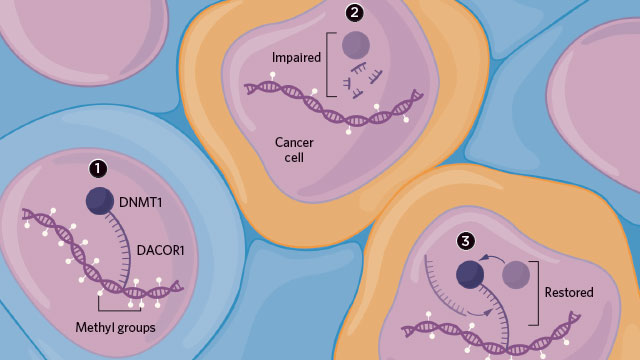 UNSUPERVISED: In a healthy colon cell, the DNA methyltransferase DNMT1 interacts with the long noncoding RNA DACOR1 to properly methylate the cell’s genomic material (1). DACOR1 is downregulated in cancer cells, thus upsetting DNMT1’s activity and changing the cells’ methylation patterns to promote tumor growth (2). Adding DACOR1 back into cancer cells restores some normal methylation and gene expression (3).© LUCY READING-IKKANDA
UNSUPERVISED: In a healthy colon cell, the DNA methyltransferase DNMT1 interacts with the long noncoding RNA DACOR1 to properly methylate the cell’s genomic material (1). DACOR1 is downregulated in cancer cells, thus upsetting DNMT1’s activity and changing the cells’ methylation patterns to promote tumor growth (2). Adding DACOR1 back into cancer cells restores some normal methylation and gene expression (3).© LUCY READING-IKKANDA
The paper
C.R. Merry et al., “DNMT1-associated long non-coding RNAs regulate global gene expression and DNA methylation in colon cancer,” Hum Mol Genet, 24:6240-53, 2015.
DNA methylation is a critical regulator of gene activity. In cancer cells, faulty methylation patterns contribute to the excessive growth and dysfunction characteristic of tumors. While increased methylation often occurs at sites of tumor suppressor genes—turning off their activity—reduced methylation is widespread throughout other parts of the genome, freeing up many sections of DNA to be improperly expressed.
“No one understands what’s driving the hypomethylation” in cancer cells, says Ahmad Khalil, a geneticist at Case Western Reserve University in Ohio. “The initial hypothesis was that maybe the enzymes regulating histone modification or DNA methylation are mutated, or their expression is ...



















